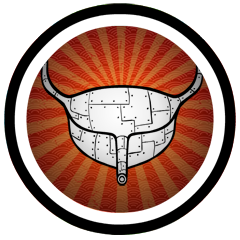10,000 Years of Strangeness: A Paranormal Primer for Ancient and Modern China
Part I: The Author's Own True Tales
Chapter 5: Wudang Mountain---武当山
Chapter 5: Wudang Mountain---武当山
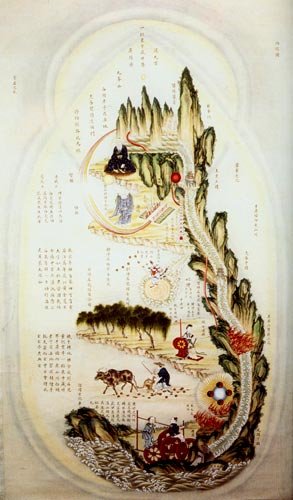
Chapter 5-2: A New Kind of Kung Fu---一个新的功夫
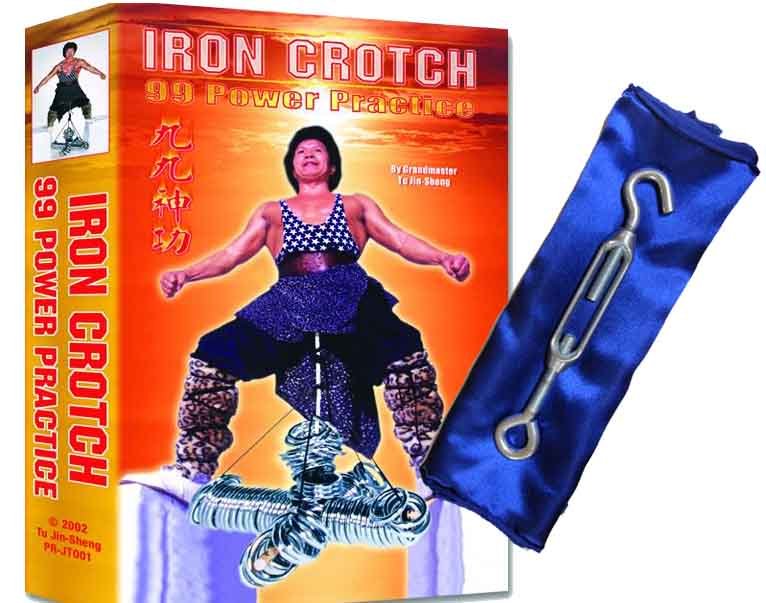
Previous Chapters 前章: Pt. 1: Chapter 1, Chapter 2, Chapter 3, Chapter 4, Chapter 5-1
The next day had us striking out for Wudang. Before we went to dinner the day before the very helpful concierge at the Holiday Inn made numerous phone calls to help us arrange travel. It became eminently clear to us that there was no such thing as a two hour bus to Wudang for 15 yuan. In fact, there was no such thing as a bus to Wudang at all. Elva’s facial expression at the discovery indicated to me there was no need to say "I told you so." One of the best things about us was that we didn’t argue, so I didn’t. Anyway, it's hard to say that to someone who loves you so much and works so hard to please you.
That week was known as "Golden Week" in Chinese. There are three golden weeks--one in February to celebrate Chinese New Year, one in May to celebrate Communist Labor Day (recall that in America, “capitalist Labor Day is September 1st), and one in October to celebrate the establishment of the People’s Republic of China. These were the only vacations most Chinese got, so there were one billion people all trying to travel at the same time. This limited our options as most people had the foresight to BOOK AHEAD. We didn't.
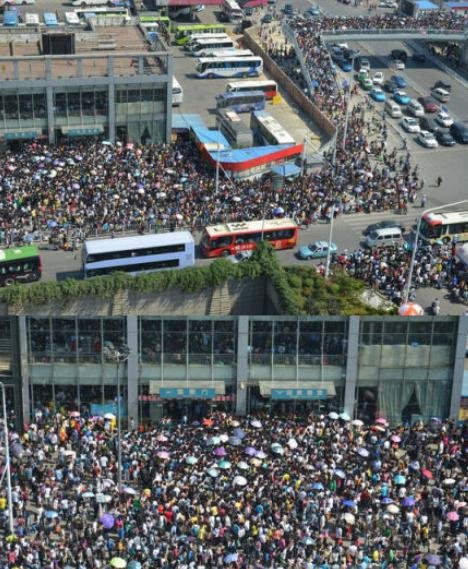
Thankfully they’ve dispensed with the Golden Week system, spread holidays throughout the year, and instituted more generous personal leave policies.
There was a train to Wudang, but of course it was sold out. There were also trains to nearby destinations like Xiangfan and Shiyan, but they too were sold out. There are absolutely no flights at all, as that market hadn't yet evolved to modern standards (more on that later).
The Lonely Planet guide advised that a bus was available from the Wuchang bus station directly to Wudang. It’s wrong. The book known as The Bible for travelers in China was disappointing us one turn after another. Perhaps the appellation is still pertinent.
That left us with a bus ride to somewhere else. And it was more convenient than we even imagined. There was a long distance bus station across the street from the hotel on Jiefang Dadao (Jiefang Boulevard) where we could get an express bus to Xiangfan with connections to Wudang.
That morning we headed to the bus station and purchased tickets. For a 2:00 p.m. bus. It was the only one available. Every other damn bus was sold out, and this one was added to the route at the last minute to accommodate the demand. Now we had the pleasure of spending several hours at the bus station, a crowded, smoky, and stinky place.
We checked our bags and went shopping.
The bus that showed up at 2 p.m. was a mini-bus. No reclining seats, no leg room. It would be fetal position all the way for a six-hour ride. The bus even stopped on the outskirts of town and picked up a few extra passengers that required setting plastic stools in the aisle for them to sit on.
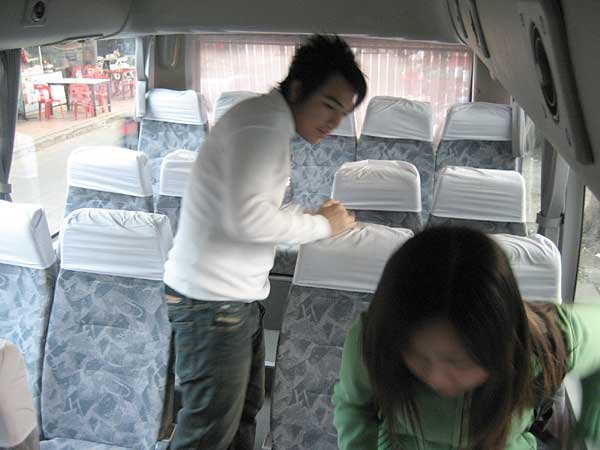
See, as a safety requirement, the law in most parts of China says that all passengers must be seated. In a regular seat this makes good sense. How safety extends to plastic stools in the aisle is questionable. To begin with the stools are not bolted down. Secondly, in the event of an emergency evacuation, there will be none. People would be trampled and crushed. And the buses here don't have pop out windows for such instances. But at least all the passengers would have been seated in compliance with local and federal law.
The cramped conditions were not the worst part of the trip though. What was really amazing was that we discovered our bus driver practiced a unique sort of kung fu. But before we get into that, let’s review some of the kung fu styles without getting too long winded: there’s tai ji quan; Iron Shirt (铁衫), bagua zhan (八卦掌); Huaquan (華拳), or China Fist; Bai He Quan (白鶴拳), or White Crane. In fact, here’s a couple of graphics to help you out.
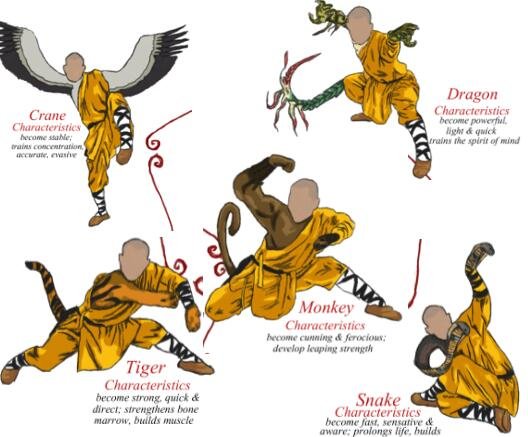
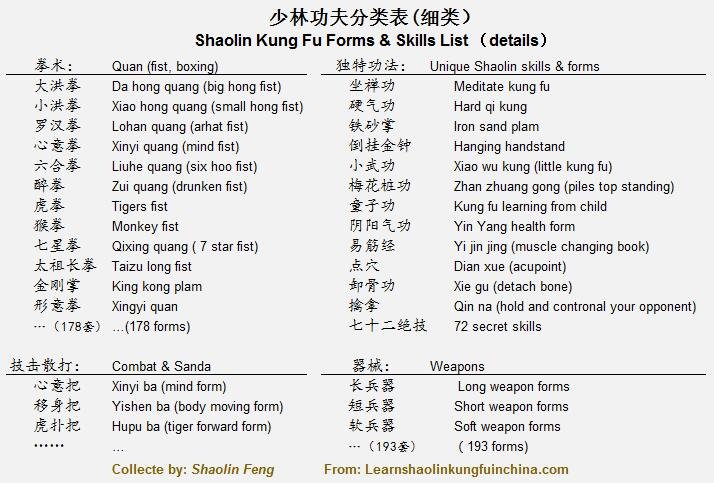
We mentioned Iron Shirt above, and you’ll see on the bottom list that there is a kind of kung fu called Iron Sand Palm. What you do not see on that list, because our bus driver had either just invented it or came from a long line of secret practitioners, is the new kind of “iron” kung fu we encountered that day on the bus: Iron Bladder Kung Fu! In Chinese, it might be called 铁膀功夫 (Tie Pang Gong Fu)!
I’ve had this experience before in China. I believe somewhere on Wudang, or perhaps at Shaolin, there is a special school for bus drivers where they learn this skill. I’m certain of it. It involves a special sort or epidermal respiration where excess water is expelled through the skin, not as sweat, but as vapor. If you watch the bus drivers skillful in this technique, you can see the cloud of vapor around them like the mirages that appear on highways in the desert.
So I didn’t eat or drink anything starting an hour before the bus drive and nothing during. This is the best course of action and allows you, by cheating, to challenge the iron bladder's endurance.
Now most long distance buses in China also have hostesses, like airline stewardesses, but for buses. They also practice Iron Bladder. Elva shouted to the hostess to stop the bus. After a minute or two, it was clear she hadn’t heard, so Elva climbed over me into the aisle and struggled and dodged, like an adroit running back at the goal line, to reach within shouting distance of her and called out again. “Ting che! Ting che! Women yao niao niao!” which means “Stop the bus! Stop the bus! We have to pee!” The hostess stood up and said they'd hit the next gas station.
What surprised me is that no one else supported her calls. Was it really possible that she was the only person on the whole bus who had to pee? Were all these people iron bladder practitioners? And was this an important clue indicating the iron bladder school is located in the Wudang area?
As the bus pulled into the gas station we saw exactly what was expected during an emergency evacuation. The people in the aisle could not get up fast enough as people stumbled and fell forming a violent scrum in the aisle for the entire length of the bus, thus delaying the second ‘emergency evacuation’ we were all desperate for.
Now this was puzzling. What were all those people on the bus going to do? Just endure their agony until arriving in Xiangfan? This was one of the great mysteries of the Chinese mentality to foreign visitors. They just let themselves be herded around like this. Nobody thought to change the situation. The origins of this go back thousands of years and explain a lot about modern, uh, make that present day, China. But in all fairness this has changed dramatically in the last 10 years as the ba ling hou (80s-born) and jiu ling hou (90s-born) grow up and demand to get what they pay for in a new, more open culture.
I didn’t really have to go too badly but I did, to be on the safe side. The driver remained in the bus with the engine running. As I glanced over, I looked for a trucker's buddy tucked away somewhere that he might be using, but spied none. That would have surely debunked the myth of iron bladder kung fu, but without it, the legend and mystery live on.
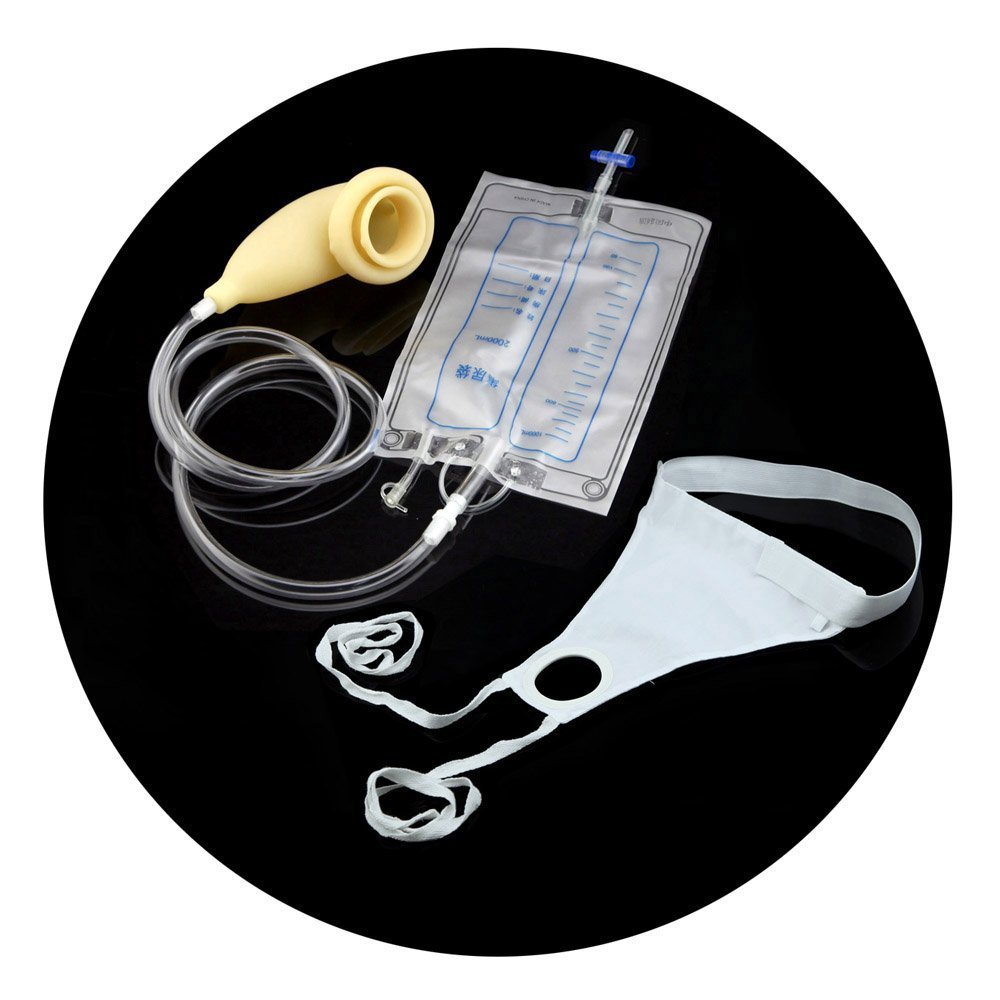

Over three hours after that piss break we arrived in Xiangfan without another stop. He careened along dark country roads that were in such disrepair and at such harrowing speeds that we felt like we were riding inside one of those hardware store paint can mixers. Only this was a six hour affair instead of 2 or 3 minutes. The barf bags came out. Fortunately neither Elva nor I were prone to motion sickness, but the faint aroma of other people’s puke escaping their bags didn’t help.
He dropped us off across the street from the bus station where taxis and pedi-cabs awaited. I never know how they know these buses are coming and aren’t going to stop at the bus station. But there they are, waiting where the bus pulls up. It was almost midnight.
A friendly local advised us not to try and make Wudang that night. There were no buses, the station was closed, and we would have to rent a private vehicle. Plus getting a hotel in the middle of the night would prove difficult.
So, here again, we were delayed in yet another primitive modern city. This place really was like Guigang, the last tier city in Guangxi where I had spent my first six months. The hotels were about the same quality, the bus station closed early, and the people had the same unfashionableness and gawking habits. They accosted you everywhere to go somewhere else, a hotel or restaurant, and we ignored them all.
We found a nearby hotel the friendly local pointed out to us, and it was adequate for an overnight. Not sure what to make of it really though as they offered hourly rates and had a poster on proper condom use by the elevator. In this regard it was also different than Guigang as in Guigang people pretend they don't have sex.
The first room the girl showed us had twin beds and was 180 yuan. We thought it was high for the quality being offered. Then she looked at us and said, “Oh, but you don't need separate beds, do you?" I burst out laughing hysterically as this was the first time a stranger anywhere in China was so frank about such an observation. She said it so innocently and so matter-of-factly, it was hilariously refreshing.
She took us to a single that was only 100 and that was acceptable. It had little packets of special Chinese medicine "sex cleaners" for washing your parts before and after labeled in Chinese and English. One was specially formulated for males, the other for females. I would've kept them as novelties but they cost 10 yuan each.
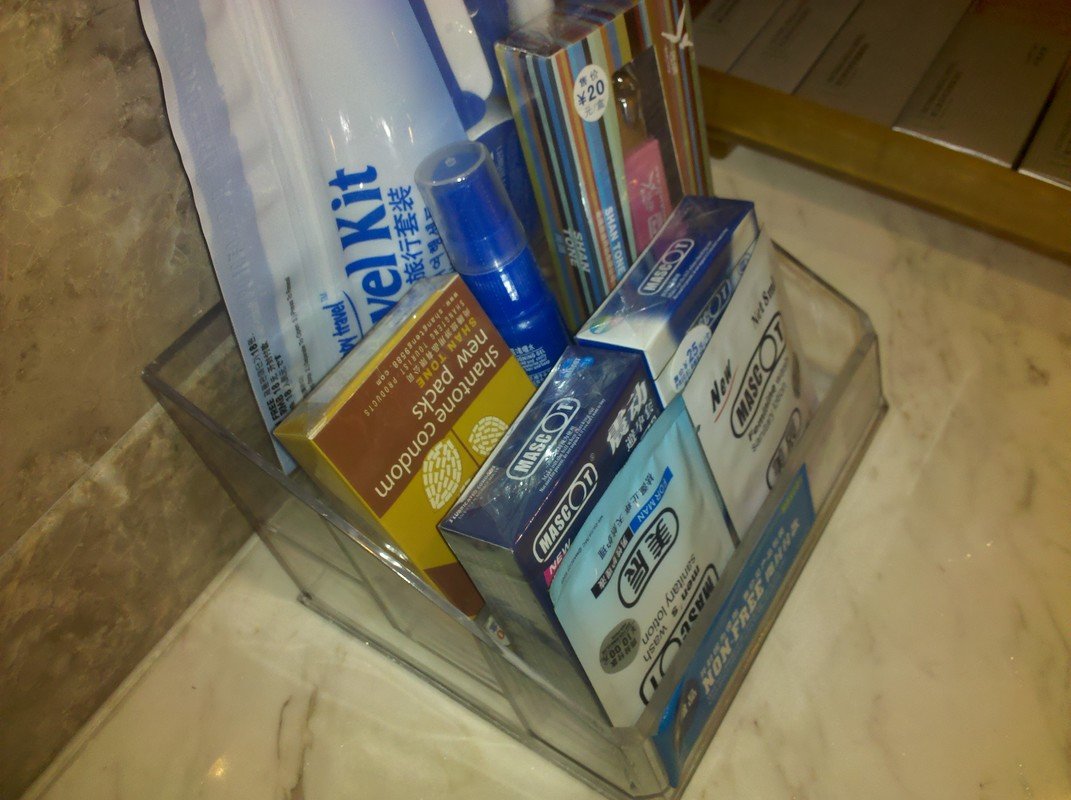

The view from the hotel was other people's hotel rooms. For some reason, the Chinese don’t like to close curtains. And really, some of them should. We closed ours.
